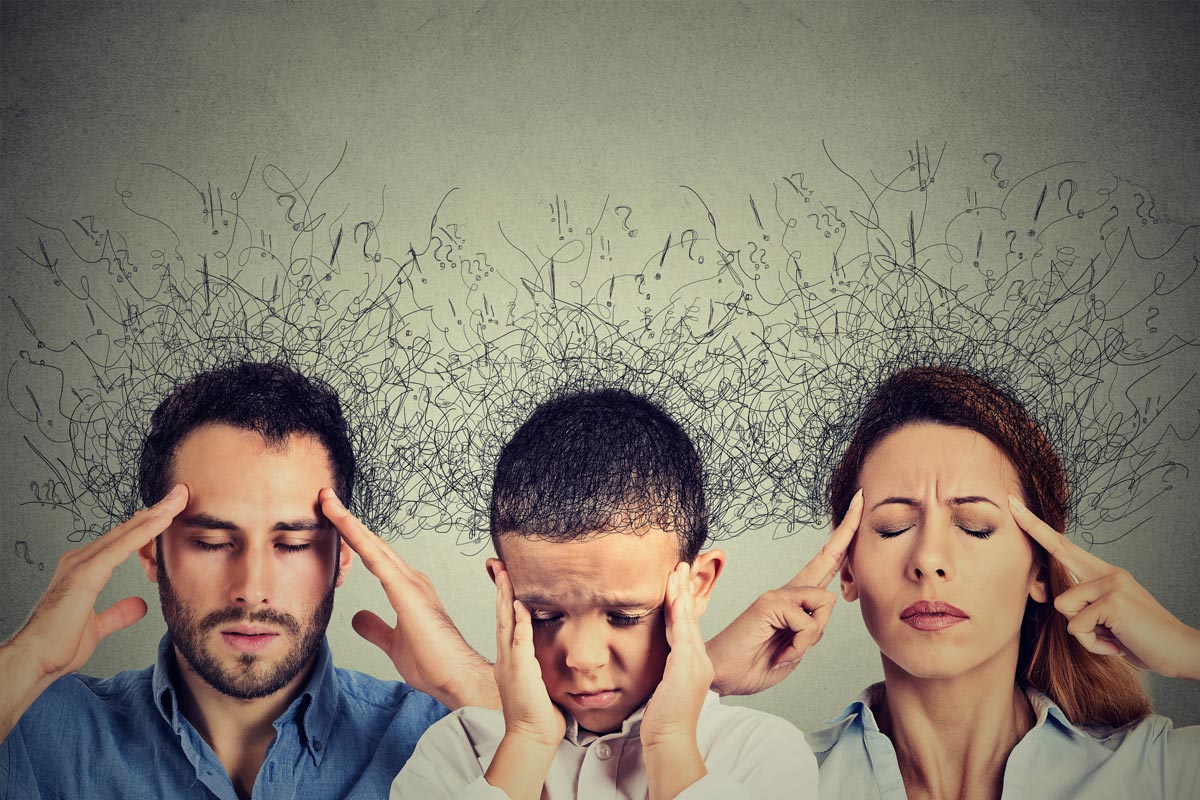
A Deeper Discussion About Emotional Distress
Stress is a hot-button topic right now, and for good reason.
Between looming deadlines at work, family obligations, national and international political strife, the rising cost of living, traffic and the 24-hour social media spiral that leaves us feeling inadequate in some way (thanks, FOMO), it's no wonder a recent survey by the American Psychological Association shows that the United States is at its highest stress level yet.
The survey singled out trends among adults ages 35 to 44, who reported the most significant increase in chronic health conditions since the COVID-19 pandemic (58% in 2023 compared with 48% in 2019). Those in this age range also experienced the highest increase in mental health diagnoses over the past four years (45% in 2023 compared with 31% in 2019), citing money and the economy as contributors to feelings of long-term stress.
It's clear we're stressed out – so what can we do?
The first step is to understand what exactly "stress" is.
What is Stress?
"Emotional distress" is a general term used to describe a wide range of negative emotional reactions that people can have in response to a stressful situation in their environment or in their personal life.
The degree of emotional distress a person experiences is moderated by both external and internal factors.
"In our environment, the severity, frequency and/or length of a stressful event can impact us significantly, as well as how available social support might help to weather these tough times," explains Dr. Bart Pillen, a clinical psychologist at Kapiolani Medical Center for Women & Children.
 "Internal assets for reducing distress may include our physical health and positive life habits, how we direct our thoughts and perceptions, our problem-solving knowledge and skills, and the spiritual or personal meaning that we attach to adversity," Pillen adds.
"Internal assets for reducing distress may include our physical health and positive life habits, how we direct our thoughts and perceptions, our problem-solving knowledge and skills, and the spiritual or personal meaning that we attach to adversity," Pillen adds.
According to Pillen, when we encounter a difficult day or a single challenging event, we are less likely to experience lasting distress and should be able to rebound quickly.
Heard of the saying, "Don’t cry over spilled milk?" The same goes for everyday stresses that may cause a small amount of distress but are easy to move on from once the problem is rectified.
"If you are driving to work, for example, and end up with a flat tire, you may need to call AAA or fix the tire yourself, but hopefully, you would get back on track and not allow this interruption to alter your view of yourself or the day," Pillen says.
If, however, you encounter a situational stressor that is very difficult to solve – or is chronic or severe – that is when the event (or series of difficulties) can become internalized and undermine your physical and cognitive responses in similar situations.
"Distress can be caused by situational events, especially when they are severe or repeated. However, it is also common for people to over-focus on a thought, emotional reaction or physical symptoms that can magnify their overall level of distress," Pillen says. "This can become so pronounced that an internal symptom itself can be the trigger for further distress."
The Mind-Body Connection
The way negative thoughts amplify distress can be seen in the following example.
Someone who suffers with chronic pain is highly aware of the toll their condition takes on their body. In anticipation of their symptoms, that person also may experience anxiety before the physical pain even begins, which magnifies both their psychological and physical level of discomfort.
"Research also has consistently shown that the tenor of our thoughts can either prolong or shorten distress, depending on how we focus our perceptions," Pillen says.
For example, research by John and Julie Gottman done at the University of Washington indicates that when an argument occurs in a relationship, it will take at least 15-20 minutes before physical reactions can calm down.
If a person continues to think negatively about his or her partner even after the argument has ended, physiological markers such as heart rate will remain elevated for much longer.
However, those individuals who return to their relationships with kinder, more-collaborative thoughts are much happier with themselves and their relationships.
These "distress-maintaining thoughts" can have clear impact on our physiology, emotions and relationships.
When Stress Takes Over

Most stressful events – a flat tire, an argument with your spouse – only contribute to temporary distress, which will begin to fade after a few days.
But what happens when you still feel on edge a week later?
"If your distress persists or worsens over a period of several days, or interferes with your personal, work or family functioning for a period of weeks, you should seek assistance," Pillen says.
If you persistently experience any symptoms of depression, trauma, anxiety or panic attacks, seek assistance from your primary care physician, a qualified psychotherapist (such as a licensed clinical psychologist or licensed clinical social worker), or a psychiatrist.
Seek professional assistance immediately if at any time you begin to worry about your safety or the safety of others due to your distress (i.e., you experience suicidal thoughts, you become angry or hurtful toward others, or you begin to abuse alcohol or substances heavily).
In a crisis, call 911 or go to your nearest local emergency department for immediate assistance.
You also can call the Crisis Line of Hawaii, which provides a team of trained and experienced professionals to help individuals in times of a mental health crisis.
The Crisis Line of Hawaii is staffed 24 hours a day, seven days a week.
Call 808-832-3100 (on Oahu) or toll-free at 1-800-753-6879 (on the neighbor islands).
Published on: March 28, 2024




